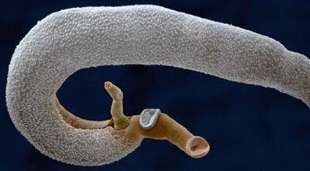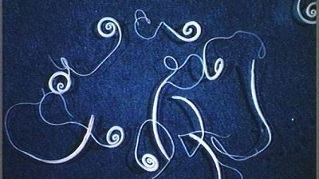Worms are parasitic worms. To this end, they use intermediate hosts and main hosts to feed on cells or tissues to absorb nutrients and vitamins that enter the human body for the host. The worms in the human stomach and intestines or other tissue structures will poison the human body with toxic substances during their life activities.
Types of parasites that enter the body through the stomach
Each type of parasite can develop in the body's inherent parts, thereby creating the best conditions for reproduction and nutrition. Certain types of parasites can transfer from one organ to another in the body. Parasitic infections occur in many ways. The most common way for parasites to enter the body is through diet. Follow basic hygiene rules to avoid problems-wash your hands before eating food and handle food thoroughly.
Due to the influence of hydrochloric acid on its membranes, the parasites cannot live long in the human stomach. The most common foreign microorganisms that parasitize the human body are:
- A worm disease-A duct that can pass through the liver and lung structures and enter the intestine. In the small intestine, roundworms develop into sexually mature individuals.
- Schistosoma-In the advanced stage, it will affect the liver tissue, leading to the development of tumor diseases and hepatobiliary dystrophy.
- Hookworm-Causes digestive tract diseases. The most dangerous to the human body are hookworms and necators. The location of the parasite is mainly in the duodenum area. Hookworms can not only enter the body through the stomach. Parasites have the ability to invade the skin, causing allergic reactions in the form of itching, burning and redness.
- Toxoplasma-The simplest parasite that often affects the human body. The disease spreads easily and is usually imperceptible to humans. Only in the case of severely weakened immunity will cause serious consequences to the body.
- Broadstriped worm-Located in a small part of the human intestine. Its length can reach several meters. The parasite can cause the development of cyanocobalamin (vitamin B12) and folate deficiency in the body. Do not rule out toxic allergic reactions of the body. Infection occurs when eating fish infected by larvae.
- Bovine tapewormis a worm that causes diseases such as helminthiasis. Bovine tapeworm parasites penetrate into the human body in a nutritive way, pass through the stomach, and remove the membrane from the stomach under the action of gastric juice. Its sucker is released, and the parasite can easily attach to the mucous membrane of the small intestine. The signs of bovine tapeworm in the body are abdominal pain, nausea and eruption of stomach contents. The patient has poor appetite and may suffer from indigestion (for example, belching). In some cases, bovine chain infection is a manifestation of skin allergic reactions in the form of urticaria.
- Pork tape wormis a worm that can be up to 10 meters in size. It is one of the largest worms that infect the human body. The parasite's eggs pass through the stomach and lose their outer shell due to hydrochloric acid. The larvae coming out of the eggs will spread to all tissues of the body, causing the development of cysticercosis. Cysticercus disease poses the greatest danger to the nervous system.
- Vlasoglavis a round worm that can cause hairy brain malformations. No symptoms of invasion for a long time. In complex cases, parasites accumulate in large numbers, and signs of ulcerative colitis or Crohn's disease may appear. People have pain in their abdomen, loss of appetite, and liquid stool. In the stool, streaks of blood and mucus were noted.


Symptoms of gastrointestinal parasites and worms
Foreign organisms lead to parasitic lifestyles in their hosts, destroy the functions of many organs, cause inflammatory processes and severely damage human tissues.
The individual parasites in the intestine use nutrients from the host's food for development and reproduction. The consequences for human beings are sad. The human body is seriously deficient in trace elements and vitamin complexes.
Children have the highest organism risk.
In the context of severe helminthiasis, physical and psychological growth and normal development are severely disturbed. Worms have the ability to perfectly adapt to the host and survive in the host for decades. Worm eggs have obvious resistance to environmental factors.
Helminthiasis in various digestive tracts can release specific toxic substances to protect them, thereby destroying enzyme activity and destroying the digestive process. Helminthiasis can cause gastritis and other indigestion diseases.
The manifestations of symptoms during a parasite infection can be very different. In most clinical cases, discomfort and pain are observed at the site of the parasite. Therefore, worms whose habitat is the skin can damage the dermis and cause allergic reactions. Parasites in the lung structure can cause coughing or shortness of breath. Symptoms of tapeworm infection include general weakness, memory loss, and abdominal and head pain. Sometimes nausea and persistent vomiting, such as stomach ulcers, can be diagnosed.
In most cases, stool disorders, bad breath, intestinal pain or digestive system diseases are related to the role of parasites in the digestive tract.
The influence of foreign microorganisms on the entire human body causes the following symptoms:
- Increased weakness;
- Headache attack;
- Insomnia;
- Bloating;
- Skin rash and skin allergic itching;
- Bronchial asthma attack.
In addition, in the context of changes in immune system function, the body's overall resistance is reduced. In young children, helminthiasis manifests as a delay in physical and mental development.
Diagnosis
The diagnostic program combines research to identify worm larvae or eggs.
The biological materials used for diagnosis are:
- stool;
- Urine;
- Phlegm;
- The contents of the duodenum;
- Bile duct secretions;
- Rectal scraping s;
- Perianal smear;
- Muscle fiber;
- Blood.
Based on the fact that worms and their particles are detected by macroscopic methods, eggs and larvae can only be detected by laboratory examinations using a microscope.
The acute phase of helminthiasis caused by parasites in tissues or larvae in the form of parasites such as toxoplasmosis, trichinosis, cysticerosis, and trichomoniasis means the use of serological samplesFor example:
- RSK-complement fixation reaction;
- HA-indirect agglutination;
- ELISA-Immunofluorescence analysis;
- AHL-Lysis and agglutination.
In some cases of helminthiasis, a reliable diagnosis can only be established with special ultrasound, computed tomography, X-ray examination and the use of endoscopy.
Treatment
The treatment of helminthiasis varies greatly. Science knows more than 300 kinds of helminths, but the main parasites that cause changes and systemic poisoning are round and flatworms. They are usually divided into intestine and non-intestine. When prescribing treatment measures, it is important to consider many of the characteristics that are unique to certain worms that endanger human health.
In order to get rid of helminthosis, experts will prescribe a complete treatment plan. It is important to consider the frequency of infection of certain organs, the intensity of infection, the level of poisoning and the duration of helminth. This allows you to prescribe the most effective method.
Medicine
To combat the type of worm diagnosed, a separate treatment plan is being developed. Experts prescribe appropriate drugs based on the patient's examination results.
Folk remedies
Traditional medicine can help eliminate parasites at home.
For the treatment of helminthiasis, you can use the following recipe:
- Wormwood seed inflorescencesmust be ground and mixed with honey. Take the medicine 3 times a day for 3 days, 1 teaspoon each time. Effective for ass worm disease.
- Wormwood infusionThe preparation method is as follows-ground the grass, pour boiling water on it, and let it brew overnight. In the morning, filter the infusion and drink 3 times a day. The course of treatment is up to 3 weeks. Effective for ass worm disease and small bowel disease.
- Pumpkin seeds.They can be used raw, dry or powdered. Mix the powder with honey and take the medicine on an empty stomach. Responding to tape worms. You can make a decoction of pumpkin seeds. Crush one pound of seeds in a mortar, pour 1. 5 liters of hot water, and then put it in a water bath. No need to boil. Drink soup on an empty stomach.
- Infusion of pomegranate peel.Dry and crush the pomegranate skin, pour in boiling water, cool, and take 1 teaspoon 3-4 times a day. The course of treatment is 7 days.
Preventive measures
If you do not follow the personal hygiene rules, you must constantly remove parasites from the body, which will adversely affect the condition of the entire body.
For prevention, the following basic hygiene rules must be observed:
- Avoid close contact with animals;
- Keep your hands clean-wash your hands every time you go out;
- The important thing is to keep the living area clean, perform wet cleaning, and wash dishes with detergent;
- If there are children in the house, it is recommended to wash children's toys with soap, especially after walking;
- There is a sticky substance in the worm eggs to prevent them from separating from the surface, so it is best to wash vegetables and fruits with warm or even hot water under running water;
- Eat meat and fish products only after initial heat treatment;
- Drink clean water and avoid tap water because it may contain lambia and schistosomiasis.




























